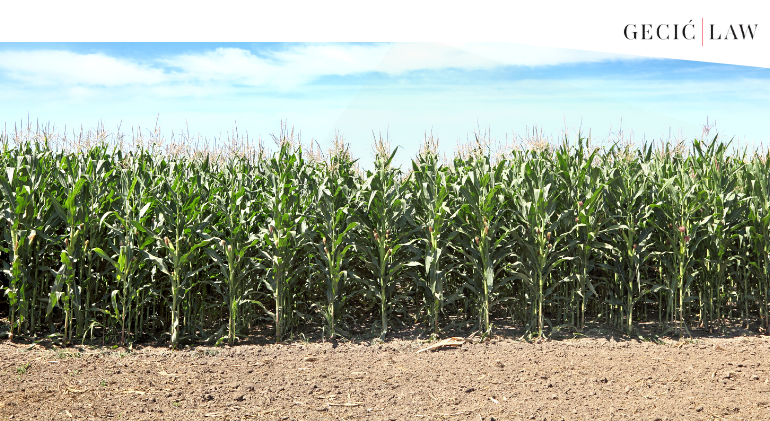

According to the January 2022 Development Agency of Serbia report, the agricultural sector recorded a significant inflow of foreign investments indicating that Serbia is fertile ground for investment in agriculture. The industry showed remarkable resilience during the crisis caused by the COVID-19 pandemic, when many countries faced food shortages. Meanwhile, during this period (January to November 2021), cereals, cereal-based products, fruits, and vegetables were among the most crucial Serbian export products.
Serbia has a long-standing agricultural tradition and optimal conditions for the development of this sector. Its land is fertile, the climate is optimal, and there is excellent potential for organic production. Valuable natural resources coupled with legal conditions such as favorable Bilateral Investment Treaties (“BIT“) in part reveal why Serbia continues to attract the attention of foreign investors in this sector of the economy. In this sense, the relations with Russia, Turkey, Bosnia and Herzegovina, and the EU (most notably Romania and Germany) are exciting, which is why we will discuss some of them in more detail.
Statistics show that Serbia has a surplus in the export of agricultural products to Russia, Turkey, Bosnia and Herzegovina, and the EU, where Germany and Romania stand out.
Through established BITs, foreign investors from these countries have fair and equal treatment, complete protection and security of investments, protection from unjustified and discriminatory measures, national and most favored nation treatment, and protection from expropriations.
Serbia has excellent customs relations with Turkey in the field of agriculture, thanks to a confirmed Free Trade Agreement of 2009 between these countries. This agreement also established the Turkish-Serbian Agricultural Supervisory Board to further develop the agricultural exchange between Serbia and Turkey and determine the direction of the cooperation and exchange of know-how in agriculture. According to the Free Trade Agreement, the parties also mutually granted privileges in the trade of agricultural products.
The same could also be said for Russia, as the trade of food products between Serbia and Russia has increased significantly in recent years. This trend is expected to continue in the future, given that the Free Trade Agreement between Serbia and the Eurasian Economic Union entered into force in July last year, which will give Serbian companies access to the large market of the Eurasian Economic Union.
It is also important to note that the Stabilization and Association Agreement between the EU and Serbia (“SAA“) established a free trade zone between the signatories. Thus, Articles 26 and 27 of the SAA abolish restrictions on the import and export of agricultural products between Serbia and the EU. In addition, the SAA provides for the abolition of customs duties on certain agricultural products. At the same time, special customs privileges are introduced for certain types of agricultural products where customs duties are still levied. No special duties are paid on the import of agricultural and food products originating from the European Union within the quotas contained in the Protocol to the SAA.
In addition, in December 2021, the transitional rules on the preferential origin of goods between the EU and Serbia came into effect. The purpose of these transitional rules is to simplify the rules of origin introduced by the Regional Convention on Pan-Euro-Mediterranean Preferential Rules of Origin (PEM Convention), and the most important innovation introduced by these preferential rules in the agricultural sector is to increase the tolerance threshold for the use of non-originating materials for agricultural products.
As agricultural activities require significant investment, Serbia has developed various subsidies and incentives for agribusinesses. The most important are IPARD funds, non-refundable incentives for agriculture in cooperation with the World Bank, incentive measures of the Ministry of Agriculture, and incentives of the AP of Vojvodina.
The IPARD incentives are certainly the most prominent, developed by the Government of Serbia in cooperation with the European Union. EUR 175 million from the EU budget and EUR 55 million from the national budget make a total of EUR 230 million in non-refundable funds for supporting the agriculture sector in Serbia. Through this facility, Serbia supports farmers in purchasing new equipment, machinery, mechanization, construction, extension, reconstruction, and reparation of facilities. Priority in this regard is given to the production sectors of meat, milk, fruits, vegetables, eggs, grapes, and other crops.
Additional assistance to investors is provided by the Ministry of Agriculture, which in cooperation with the World Bank, offers non-refundable funds for investment in agriculture. Types of investment supported include initial costs, capital investments, human resources, professional and technical assistance, and grant beneficiaries’ training. The Ministry of Agriculture has also developed a particular incentive (incentives for delivered agricultural products, sown crops, livestock breeding, purchase of new machines, equipment, and construction for various facilities), including credit support in agricultural production. In this regard, investors have access to special types of loans, including loans for farming development, fruit cultures, viticulture, vegetables, and floriculture.
Finally, several types of incentives are available to farmers in the territory of Vojvodina. Among the most important are incentives for irrigation, farm equipment, beekeeping, and agricultural processing. Also, special incentives have been developed for young farmers to encourage and support their development in this sector of the economy.
Foreign investors will also have access to the listed incentives under certain conditions, which should be met before applying.
The agricultural sector in Serbia has great potential. Among the conditions are critical international ties and favorable local legislation. In addition to agriculture, Serbia has significant potential in the pharmaceutical industry, which will be the main topic of our next article.
Until then, if you have any questions related to agricultural investments or subsidies, please do not hesitate to contact us at office@geciclaw.com.
Authors: Vuk Leković, Nemanja Sladaković